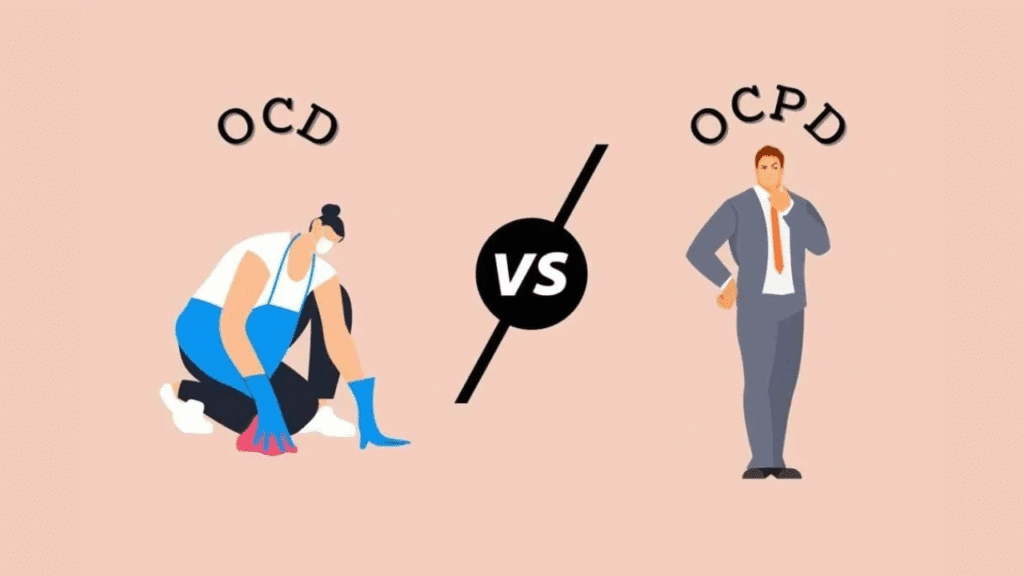OCPD
Obsessive-Compulsive Personality Disorder
Obsessive Compulsive Personality Disorder (OCPD) is often misunderstood as “just being perfectionistic.” However, in clinical practice at Emotion of Life, we, OCD Specialist Therapist Shyam Gupta and Female OCD Specialist Therapist Pratibha Gupta, see how OCPD deeply impacts relationships, work-life balance, and emotional well-being.
Unlike OCD, where intrusive thoughts create distress, OCPD is marked by a rigid personality style – perfectionism, control, and extreme orderliness – often affecting one’s ability to relax and connect with others.
At Emotion of Life, OCD Treatment, Research & Training Institute, Agra, we provide structured, evidence-based therapy that helps clients move from rigidity to flexibility, from control to balance, and from constant self-criticism to healthy self-acceptance. OCPD is a mental health condition categorized under personality disorders. Unlike Obsessive-Compulsive Disorder (OCD), OCPD is marked by an extreme focus on control, orderliness, and strict adherence to personal standards. Individuals with OCPD often expect themselves and those around them to follow rigid rules and routines. Their desire for structure can become so intense that they may try to direct or manage others according to their own ideals and values. This can include assigning responsibilities to others in a controlling or inflexible manner, not out of cooperation, but due to an overwhelming drive to maintain their version of order and efficiency.
Symptoms of OCPD / Obsessive Compulsive Personality Disorder
- Spending too much time working so that it harms family life and social activities.
- Paying too much attention to lists, rules, and tiny details.
- Perfectionism that interferes with finishing tasks
- Rigid following of moral and ethical codes
- Not wanting to give tasks to others unless they do it exactly the same way.
- Lack of generosity; extreme frugality without reason
- Hoarding behaviours
Diagnosis of OCPD / Obsessive Compulsive Personality Disorder is made when these traits result in a significant impairment in social, work and/or family functioning. Someone doesn’t have to show every symptom to be diagnosed with the personality disorder.
What is the difference between OCPD and OCD?
- People with OCD know their thoughts don’t make sense and often find them upsetting People with OCPD strongly believe their way is the right one and are comfortable sticking to their strict routines and standards.
- In OCD, the thoughts and fears often don’t relate to real-life problems. In contrast, people with OCPD are focused on doing everyday tasks in a strict, structured way.
- OCD can affect different parts of a person’s life, such as their job, social life, and family connections. OCPD, on the other hand, mostly impacts how a person gets along with others. While people with OCPD may work very efficiently, their strict habits can cause tension with co-workers or bosses.
- Those with OCPD often don’t think they need treatment, as they believe everything would run smoothly if others simply followed their way of doing things. They may only seek therapy when faced with losing a job or relationship due to conflicts. In contrast, people with OCD are often upset by their thoughts and behaviours. They know their actions can be hard on others and often feel guilty about it.
- People living with someone who has OCPD often feel constantly judged and restricted by their behaviour. Living with someone who has OCPD can be frustrating and upsetting, much like living with someone who has OCD, and this often causes conflicts.
Prevalence of OCPD / Obsessive Compulsive Personality Disorder: About 1 in 100 people is estimated to have OCPD, OCPD is diagnosed in twice as many men as women, Many people show some signs of OCPD without actually having the full disorder.
What causes OCPD / Obsessive Compulsive Personality Disorder
- There is no single, specific “cause” identified
- Some theories propose that individuals with OCPD might have grown up with parents who were distant, very controlling, or too protective. They may have faced strict punishments during childhood. As a result, OCPD traits could have formed as a way to cope—by trying to be flawless and obedient to avoid trouble.
- Genes might influence OCPD, but research on this is still limited.
- Cultural factors may play a role. Growing up in strict, rule-focused societies or religious groups can shape how a person’s personality develops. However, it’s important to remember that not all strict cultures are harmful—sometimes, OCPD traits are actually valued and encouraged in these settings.
Treatments of OCPD / Obsessive Compulsive Personality Disorder
- Therapies like cognitive behavioral therapy (CBT) and other approaches that help people understand themselves better, such as psychodynamic therapy, can be useful. The aim is to reduce strict rules and help people appreciate relationships, hobbies, and fun more, rather than focusing only on work and getting things done.
- Breathing exercises and relaxation methods can help lower the stress and urgency that people with OCPD often feel.
- Wellness coaching helps great way
- Enhancing mental health, coping strategy, personality skewed dynamic correction
Obsessive Compulsive Personality Disorder (OCPD) is often misunderstood as “just being perfectionistic.” However, in clinical practice at Emotion of Life, we, OCD Specialist Therapist Shyam Gupta and Female OCD Specialist Therapist Pratibha Gupta, see how OCPD deeply impacts relationships, work-life balance, and emotional well-being.
Unlike OCD, where intrusive thoughts create distress, OCPD is marked by a rigid personality style – perfectionism, control, and extreme orderliness – often affecting one’s ability to relax and connect with others.
At Emotion of Life, OCD Treatment, Research & Training Institute, Agra, we provide structured, evidence-based therapy that helps clients move from rigidity to flexibility, from control to balance, and from constant self-criticism to healthy self-acceptance.
16-Step OCD Recovery and Cure Program at Emotion of Life
- Initial comprehensive assessment
- Psychoeducation about OCD and OCPD
- Goal-setting tailored to client’s needs
- Daily structured therapy sessions
- Cognitive restructuring of rigid thought patterns
- ERP exercises adapted to personality rigidity
- Habit reversal training
- Stress and anxiety management techniques
- Lifestyle restructuring & balance training
- Mindfulness and self-compassion integration
- Family and relationship guidance
- Building resilience against relapse
- Weekly progress reviews
- Advanced wellness coaching
- Personality flexibility development
- Long-term maintenance plan for a balanced life
Our Specialist Recommendation for OCPD Treatment
As specialists, we strongly recommend structured CBT-based therapy combined with lifestyle reorientation. At Emotion of Life, we don’t just target symptoms—we work on personality rigidity, thought restructuring, and emotional balance.
Our OCD Recovery and Cure Program integrates:
- CBT (Cognitive Behavioural Therapy) for perfectionism and rigidity
- ERP (Exposure and Response Prevention) for anxiety-linked behaviours
- Wellness coaching to build flexibility and self-compassion
- Daily structured guidance (online or onsite at Agra)
2 Client Success Stories at Emotion of Life
Success Story 1 – Radhika, 30, from Delhi
Radhika was a successful IT professional but her perfectionism made her spend hours reviewing emails and obsessing over the tiniest errors. At Emotion of Life, under the guidance of Shyam Gupta, she learned to accept “good enough” instead of “perfect.” Today, she manages her work efficiently and enjoys weekends without guilt.
Success Story 2 – Sameer, 35, from Pune
Sameer’s relationships were strained because of his rigidity and control in household routines. Through therapy with Pratibha Gupta, he gradually allowed flexibility into his life. Today, his bond with his wife and children has transformed. He now describes himself as “present, balanced, and happier than ever.”
Client Reviews from Emotion of Life
You can read full reviews on our website: www.emotionoflife.in/review
Review 1:
“Before joining Emotion of Life, I felt trapped in my own rigid patterns. With therapy, I learned to relax, accept flexibility, and rebuild my relationships. I am truly grateful to Shyam Gupta for his expertise.”
Review 2:
“Pratibha Gupta’s therapy approach gave me the tools to manage my perfectionism. Today, I live with freedom and joy. Emotion of Life changed my life completely.”
5 Frequently Asked Questions (FAQs)
Q1. Is OCPD the same as OCD?
No. While both involve control and rigidity, OCD is driven by intrusive thoughts, while OCPD is a personality style with perfectionism and strict orderliness.
Q2. Can OCPD be treated without medicine?
Yes. At Emotion of Life, our OCD Recovery and Cure Program uses CBT, ERP, and wellness coaching to treat OCPD naturally.
Q3. How long does it take to see results in OCPD treatment?
Most clients start seeing improvements within 3–6 months, with deeper personality changes over 9–12 months of therapy.
Q4. Who are the specialists at Emotion of Life?
Our program is led by OCD Specialist Therapist Shyam Gupta and Female OCD Specialist Therapist Pratibha Gupta, with 40+ years of combined experience.
Q5. Can online therapy help with OCPD?
Absolutely. We provide structured online sessions worldwide, offering the same effectiveness as our onsite program in Agra.
Conclusion: Specialist’s Final Note
At Emotion of Life, we believe OCPD recovery is possible without medicine. With structured therapy, expert guidance, and consistent practice, clients reclaim their flexibility, relationships, and joy. If you or your loved one struggles with OCPD or OCD-related issues, reach out to us at Emotion of Life – OCD Treatment, Research & Training Institute, Agra.
Call now: +91 9368503416
Website: www.emotionoflife.in
Email: info@emotionoflife.in







